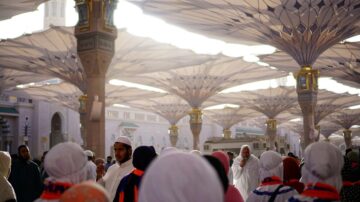After pilgrims properly finish all the prescribed rites — while cloaking themselves with the best of all manners, committing themselves to the Sunnah of the Prophet, and devoting all their movements and even their silence to Allah alone — they still have some things to observe after returning to family and property. This makes their Hajj a never-ending ritual, even if they never perform it again in their life. This can be explained as follows:
1. During Hajj, the pilgrims have attained a great dose of taqwa (piety), and hence, after their return they should be in constant fear of Allah and His mighty status. They should observe all their moves in order not to violate any of the rules set by Allah the Almighty to guide humanity to the right path.
2. Throughout Hajj, the pilgrims should have realized the reality of tawheed (oneness of Allah). Thus after their return they should sincerely observe the following:
a. Invoke none but Allah
b. Seek refuge from none but Allah
c. Ask no one but Allah for everything
d. Make oaths in no one’s name but Allah’s
e. Dedicate vows only to Allah
f. Recognize that legislation is the right of Allah alone
On the contrary, if pilgrims return with any sort of lack or distortion in their creed, they have learned nothing from that magnificent journey.
3. It is the responsibility of each and every pilgrim to observe the moral code observed during Hajj. So if, before going on Hajj, any were reluctant to abide by the best of all manners, they should, after their return, be more committed and constant in observing the moral system of Islam, which is a unique and distinguished one.
At the end, there is one remaining question: What is the value of an accepted Hajj, a Hajj mabrur?
To answer this question, let’s recall only three Prophetic hadiths.
Abu Hurairah narrated: Allah’s Messenger was asked, “‘What is the best deed?” He replied, “To believe in Allah and His Messenger (Muhammad).” The questioner then asked, “What is the next (in goodness)?” He replied, “To participate in jihad in Allah’s cause.” The questioner again asked, “What is the next (in goodness)?” He replied, “To perform Hajj mabrur” (Al-Bukhari).
Abu Hurairah narrated: Allah’s Messenger said, “Whoever performs Hajj to this House (Ka`bah) and does not approach his wife for sexual relations nor commits sins (while performing Hajj), he will come out as sinless as a newborn child” (Al-Bukhari).
`A’ishah narrated that she said, “O Allah’s Messenger! We consider jihad as the best deed. Should we not fight in Allah’s cause?” He said, “The best jihad (for women) is Hajj mabrur” (Al-Bukhari).
I do not think I need to add anything to this. What can anyone say after the Prophet (peace and blessings be upon him) says and teaches?
But what does all this mean? It means that pilgrims must spare no effort in adhering to these criteria and observances in order to render their Hajj valid and acceptable by Allah. If these criteria were not met while they are performing the rituals, their Hajj will be nothing more than one similar to the pilgrimage the polytheists used to perform in pre-Islamic times and it will bear no fruits whatsoever.
Would anyone like to go on Hajj — with all the difficulty and tremendous expenses of the journey — and come back empty-handed, without any reward from Allah? I doubt it.
by Ali Al-Halawani **

